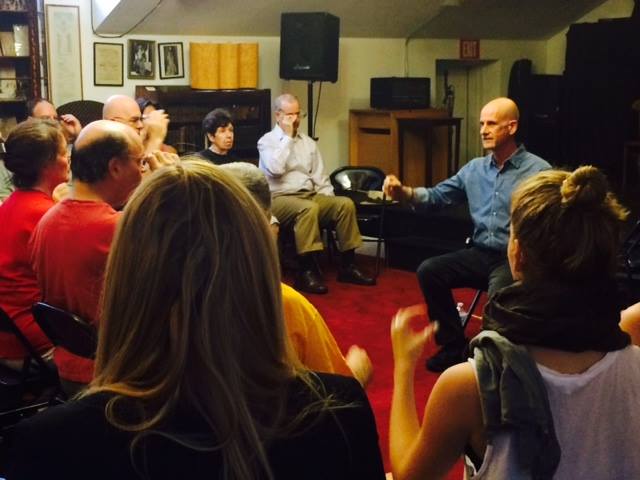
“It’s not what you do, it’s how you do it.” “The Alexander Technique is the how of how you do anything.”
Those phrases have been spoken countless times by Alexander Technique teachers at Alexander Technique lessons. The Alexander Technique is the how of everything you do. It’s how you sit at the computer, more than just that you’re sitting at the computer, that might lead to bad posture, neck pain, back pain, or shoulder pain. As an Alexander Technique teacher I help people sit at the computer, stand, and walk, with more ease and less tension. This results in improved posture, pain relief, and an overall sense of well-being.
There is also another angle, however, regarding how you use the Alexander Technique; it’s what you don’t do, as much as what you do, that helps with your posture, pain relief, and general ease. In other words, to really get the benefits of the Alexander Technique, we need to stop doing all the things that are not the Alexander Technique. We need to stop not doing the Alexander Technique!
A relatively new Alexander Technique student told me she had made some interesting discoveries during the week. Not only did she notice the frequency, intensity, and duration of her slumping, but she became aware of other habits which were exacerbating her neck pain. For instance, when she was folding clothes, she noticed her habit of holding clothes and pillowcases between her chin and upper chest. Prior to Alexander Technique lessons, she just labeled this action as ‘folding clothes’. She now noticed that what she was doing was severely compressing her spine. Tucking your chin in this way compresses your cervical spine and, I’ve noticed, the longer your neck the more exaggerated the compression.
She also noticed that she habitually held her phone between her neck and shoulder as she multi-tasked. This also results in damaging compression. This particularly common habit is more well-known. It is often seen on ‘Ten Ways To Relieve Neck Pain’ or, ‘Fifteen Ways To Improve Your Posture‘ lists. The ‘don’t hold the phone with your neck’ admonition also makes an appearance in the countless ‘Your Mother Was Right’, or ‘Sit Up Straight!’ articles. Do this; do that.
Again, instead of doing the Alexander Technique this student became painfully aware of when she was not doing the Alexander Technique. F.M. Alexander said: If you stop doing the wrong things, the right things do themselves. The list of ‘wrong things’ is almost infinite. The “Don’t” list is endless.
The Alexander Technique teaches you about you, and you begin to notice things you might have previously been unaware. You apply the simple Alexander Technique principles to whatever you do.
You then might say: “I never noticed that I…’ or ‘I never noticed how much I…’
Awareness is the first step, and we can’t change things of which we are unaware. Noticing one’s habits and changing the one’s that are not beneficial has a profound effect on people’s physical, mental and emotional lives.
Join the conversation!
Are you aware of habits you would like to change?
How can you use the Alexander Technique to help improve your posture or decrease pain?
What is one simple way to improve posture, or decrease chronic neck or back pain?
Mark Josefsberg-Alexander Technique NYC
(917) 709-4648










“The Alexander Technique teaches you about you, and you begin to notice things you might have previously been unaware.” I like that quote Mark.
I would add that you also begin to notice things about other people that you hadn’t noticed before. After taking lessons for a couple of months, I remember meeting someone I hadn’t seen in awhile and was shocked to see his high level of twisting neck tension. I almost asked if he’d had an accident – but stopped at the last minute when I realized that what had changed was my perception, not him!
Hi Robert,
I also encourage my Alexander Technique students to observe other people, without judging them if possible. I even use this idea as another of the many Alexander Technique oppositions. If I observe someone on the street who is really hunched over, I might say to myself ‘I do that too, though maybe not to that degree. I’ll then come ‘up’ in opposition to their ‘down’, as I wish them well. And, almost nobody hunched over more than I did, especially while I was performing!
I always encourage my students to view this noticing of habits positively. It can be easy for some people to get very “down” on themselves when they start noticing themselves tightening their neck, or hunching over, or whatever the habit is. But this is a really positive thing. Before, they weren’t even aware of the habit, so there was no possibility to change. I know when they do notice themselves scrunching over the computer, for instance, they don’t stay like that once they’ve noticed, even if a moment or two later they notice the same habit cropping up again. As you say, awareness is the first step!
Hi Imogen,
I also keep my lessons as positive as possible. I believe it makes for better learning, and less neck tightening! I certainly didn’t become an Alexander Technique teacher to make people feel badly, right?. Like you, I try to set up conditions whereby the Alexander Technique student, and Alexander Technique teacher, are most open to learning. Noticing your un-beneficial habits is a positive thing to my way of thinking also, Imogen. And another thing about awareness-sometimes awareness is self correcting. Notice your breath, for example. What happens?
Changing a breathing pattern is actually a very tricky habit to influence in oneself. Intending to appear less intimidating, I used to limit my own breathing by habitually letting out most of my breath and then beginning to speak. At first, I could not even get myself to do it intentionally! Forgiveness and persistence is key.
One comfort is that nobody notices a person who is practicing such a different way of speaking, even though it takes a big effort for you to change at first. They do notice increased resonance, the lack of a sense of urgency in your voice, and other interesting improvements. But they have no idea what you’re doing to bring the change about, (so it can remain your secret that you can practice anytime.)
Hi Franis,
I love the forgiveness and persistence idea. “so it can remain your secret that you can practice anytime.” That could pertain to breathing and voice work, or the Alexander Technique!
Thanks for your thoughtful reply.
My favorite part of this blogpost, Mark, is the title. I don’t want to “DO” the Alexander Technique (as if that were possible!), but I definitely want to practice being aware of it more and more, and the direction to stop “not-doing” this is excellent. Thanks!
Thanks Jennifer,
Sometimes my Alexander Technique students almost write posts for me. This week my students made a lot of discoveries for themselves; discoveries of times they weren’t practicing the Alexander Technique.